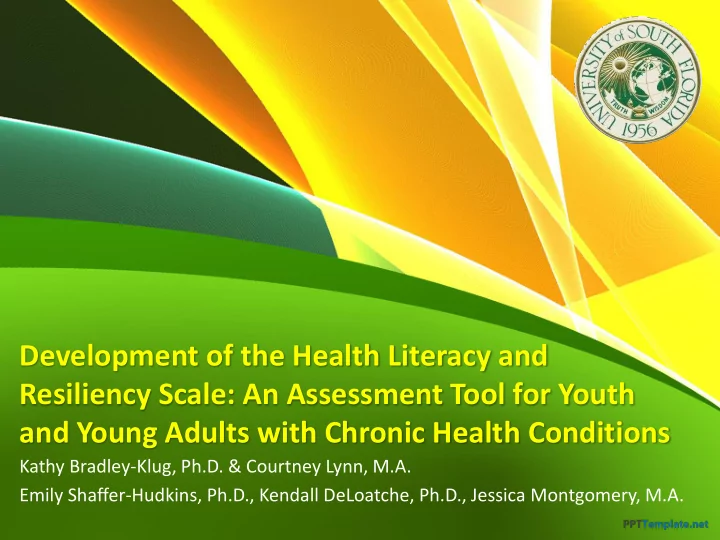

Development of the Health Literacy and Resiliency Scale: An Assessment Tool for Youth and Young Adults with Chronic Health Conditions Kathy Bradley-Klug, Ph.D. & Courtney Lynn, M.A. Emily Shaffer-Hudkins, Ph.D., Kendall DeLoatche, Ph.D., Jessica Montgomery, M.A.
Purpose of the Study • Develop and validate the HLRS-Y – Identify overarching factors relevant to a variety of chronic health conditions – Measure health literacy and resiliency across different conditions – Create items that are developmentally relevant to youth and young adults • Goal: Provide practitioners with a tool to support youth and young adults living with chronic health conditions
Definition of Constructs • Health literacy is defined as the ability to make informed health decisions in everyday life (Kickbush, 2008) • Health resiliency refers to factors that help youth adapt and cope with their chronic illness – Social supports – Health-related behavior changes – Optimism – Locus of control – Connectedness
Methods • Phase 1: – Defined the constructs and objectives of interest – Conducted focus groups – Generated pool of 101 items • Phase 2: – Reviewed by expert panel – Reduced items to 80 • Phase 3: – Recruited a pilot sample of 25 participants ages 13-21 years – Gathered quantitative and qualitative data – Reduced items to 63 (DeVillis, 2012)
Phase 4 • Recruited 204 participants – Ages 13-21 years ( M = 17.6) – Predominantly female (75.7%) – 86.6% White – Variety of chronic health conditions represented • Administered HLRS-Y using an online format • Conducted an EFA which revealed a three factor structure – Health Literacy (10 items; α = 0.88) – Self-Advocacy/Support (14 items; α = 0.94) – Resiliency (13 items; α = 0.93) • Finalized scale to 37 items • Examined construct validity
Sample Scale Items • Health Literacy Subscale – I know the common symptoms of my health condition – I know what medication(s) I need to take to manage my health condition – I know the different ways my health impacts my performance in school or work • Resilience Subscale – I focus on the positive aspects of my life – I find ways to do fun activities with friends and family while living with my health condition • Self-Advocacy/Support – I limit or modify my daily activities based on my body’s symptoms – I accept help from family and friends in managing my health condition
Conclusions • Three-factor structure – Self-advocacy/Support: the extent to which young people advocate on behalf of the accommodations and care they need and whether those around them are supportive of these needs • Preliminary evidence supports construct validity – Significant correlation between insurance type (proxy for SES) and health literacy – Time since diagnosis was significantly related to health literacy and self-advocacy
Practical and Future Implications • HLRS-Y is a user-friendly tool that provides professionals information relevant to the lives of youth and young adults with chronic health conditions • An automated, online scoring procedure should be developed to increase feasibility • Future research should continue to explore the validity of the scale with constructs such as health related quality of life and other measures of health literacy
References Kickbusch, I. (2008). Health literacy: An essential skill for the twenty-first century. Health Education, 108, 101-104. doi: 10.1108/09654280810855559 DeVellis, R. F. (2012). Scale Development: Theory and Applications . Los Angeles: Sage Publications. Gallant, M.P. (2003). The influence of social support on chronic illness self-management: A review and directions for research. Health Education and Behavior, 30 (2), 170-195.
Recommend
More recommend